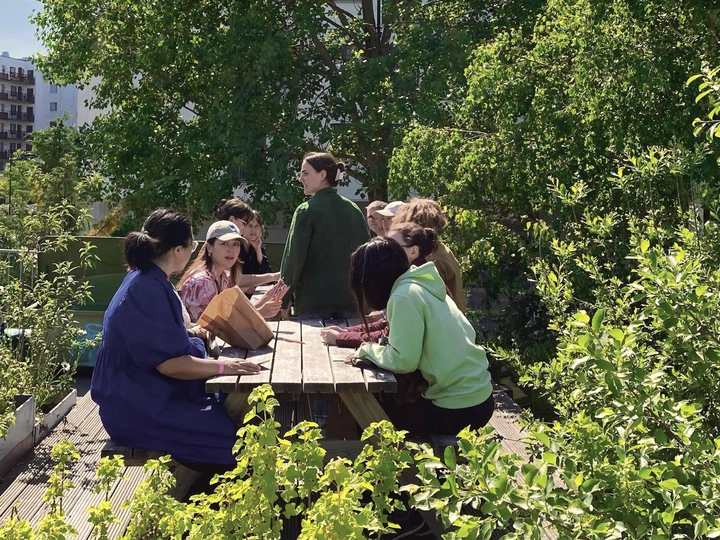The Ruderal Garden

Manos Bazanis
Poppy Bell
Natalie Blom
Alexandra Papademetriou
Adam Roigart
Emilia Rosenqvist
Mercè Torres
Vintervikens trädgården
Through practices such as collective farming, foraging, fermenting, cooking, and eating, Garden Loops reconceptualizes urbanity, fosters community, and cultivates care and sensitivity towards the natural world. Garden Loops uses workshops to facilitate open and shared learning and storytelling working to create collaborative networks and interdisciplinary dialogues. It is composed of Poppy Bell, Natalie Blom, Mercè Torres and Alexandra Papademetriou.
Poppy Bell is a Gothenburg-based architect from Australia with a strong interest in ecological and cultural preservation and care. Her texts in 'Not Just Sorry but Thanks', her project 'Above/Below' and her work at MARELD landscape architects demonstrate both a deepened understanding of living nature, and a sensitivity to human experiences and stories. Collaborative learning is a fundamental aspect of her architectural practice.
Natalie Blom is a Stockholm-based architect whose practice is centred on an interest in urban architecture that creates meaningful socio-ecological situations. Through playful narratives, she works with questions surrounding human alienation from ourselves as part of nature. She is currently investigating this during the Post Master course "Of Public Interest" at the Royal Academy of Arts.
Mercè Torres Ràfols is a Catalan artist based in Gothenburg who works with photography. She is interested in questions about the cultural heritage of a place and its traditions. These questions are situated in the landscape and are a contextual exploration of how a place changes over time, and how time is experienced by the people there.
Alexandra Papademetriou is a Greek/English artist, researcher and editor currently based in Gothenburg, where she earned her MFA in Fine Art from HDK-Valand. Her current research focus is on the subject of degrowth, and specifically how degrowth thinking and strategies can be mobilised within artistic practices to create a more equitable and humane field.
The Ruderal Garden is a project that aims to investigate how ruderal land can transform post-industrial landscapes into ecological niches with robust ecosystems.
Ruderate land, often referred to as junk land, is land that has been disturbed or altered by humans, in this generally considered inhospitable environment, ruderate plants create rich and varied ecosystems. In The Ruderal Garden we explore the idea of the gardener as a non-human actor (human, animal or plant) who takes care of the garden: a landscape both wild and cultivated.
The project will take place at Färgfabriken Konsthall, where we will build an exhibition garden which embeds our ideas and research on ruderal landscapes in public space. This garden will be open to the public and aims to engage and educate about ruderal landscapes.
We will invite experts (in botany, toxicology, ecology and gardens) to hold open workshops exploring the site through interdisciplinary approaches. At the same time, we will hold artistic workshops with the public where together we build simple habitats in the form of sculptures to attract birds, insects and other wildlife to the site and make their presence more visible.
The Ruderal Garden is designed as a multifaceted project addressing multiple interconnected concerns. On a local level, it works towards remediating the soil and revitalising the natural habitat around Färgfabriken. In doing this work collectively, we aim to build a community around this garden; while also fostering engagement with environmental issues, highlighting the inherent value in something that is often ignored.
We are also concerned by the coming and ongoing climate crisis and see this project as a way of practising more-than-human care. We believe a multispecies approach to living, architecture, planning, gardening, and moving through the world is important. We want other people to also be open to a multispecies approach and see this project as a way of signposting.